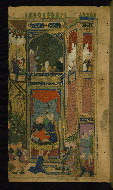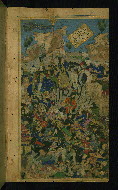Home > Digitized Walters Manuscripts
This document is a tranformation of a TEI P5 XML manuscript description incorporating images. If you have trouble reading special or non-Latin characters on this page, please make sure you have appropriate Unicode fonts installed and an up-to-date web browser.
Walters Ms. W.648, Epic of Timur
Browse images (Browse images in a new window) | TEI in XML format
W.648
Epic of Timur
Vernacular: تيمورنامه هاتفى
Authority name: Hātifī, d. 1520 or 1
As-written name: ʿAbd Allāh Hātifī
Name, in vernacular: عبد الله هاتفي
Note: Author dates preferred by cataloger: d. 927 AH / 1520 CE
This is a Safavid illuminated and illustrated copy of the History of Timur (Tamerlane) (r. 706 AH / 1370 CE -- 807 AH / 1405 CE), known as Tīmūrnāmah or Ẓafarnāmah, composed by ʿAbd Allāh Hātifī (d. 927 AH / 1520 CE) and written in imitation of Niẓāmī’s Iskandarnāmah. It was copied by Pīr ʿAlī al-Jāmī in the tenth century AH / sixteenth CE. The manuscript opens with a double-page illuminated frontispiece (fols. 4b-5a) and is illustrated with two paintings (fols. 37a and 75b). One painting depicts Timur at court and the other portrays Timur defeating the Khan of the Kipchaqs. The green leather binding with inner boards lined with ikat textile is attributable to the thirteenth century AH / nineteenth CE.
10th century AH / 16th CE
Iran
As-written name: Pīr ʿAlī al-Jāmī
Name, in vernacular: پير علي الجامي
Book
Historical
The primary language in this manuscript is Persian.
- Transliteration: katabahu al-ʿabd Pīr ʿAlī al-Jāmī /1/ tajawāza Allāh ʿanhu /2/
- Comment: In Arabic, giving the name of the scribe only
Paper
Laid paper
Foliation: ii+166+i
Two sets of earlier foliations in Hindu-Arabic numerals, one in black and one in red
Catchwords: Written obliquely on versos
14.0 cm wide by 23.5 cm high
7.5 cm wide by 16.0 cm high
- Columns: 2
- Ruled lines: 15
- Title: Tīmūrnāmah-i Hātifī
- Author: Hātifī, d. 1520 or 1
- Scribe: Pīr ʿAlī al-Jāmī
- Incipit: بنام خداۓ کہ فكر خرد...
- Text note: Main text preceded by a table of contents (fihrist) by a later hand (fols. 1b-2b), which gives the title of the chapter, the page number, and part of the first verse
- Hand note: Written in nastaʿlīq script in black ink with captions in gold and red
- Decoration note: Two illustrations; double-page illuminated frontispiece (fols. 4b-5a)
Upper board outside:
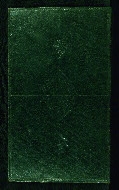
- Title: Binding
- Form: Binding
- Label: This green leather binding is attributable to the thirteenth century AH / nineteenth CE.
Upper board inside:
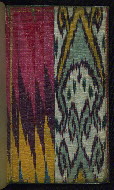
- Title: Upper board inside
- Form: Binding
- Label: The inner boards of this green leather binding are lined with ikat textile. It is attributable to the thirteenth century AH / nineteenth CE.
fol. 4b:
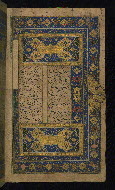
- Title: Double-page illuminated frontispiece
- Form: Frontispiece; incipit
- Label: This is the right side of a double-page illuminated frontispiece, introducing the text.
fol. 5a:
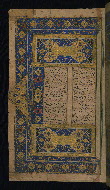
- Title: Double-page illuminated frontispiece
- Form: Frontispiece; incipit
- Label: This is the left side of a double-page illuminated frontispiece, introducing the text.
fol. 37a:
fol. 75b:
The binding is not original.
Attributable to the thirteenth century AH / nineteenth CE; green leather (no flap); blind-stamped central oval and pendants; inner boards lined with ikat textile
Seal impression: al-ʿabd Yār …[?] ibn Aq Muḥammad, dated 1019 AH / 1610-11 CE (fol. 166a)
Date: Rajab 1269 AH / 1853 CE (fol. 4a)
Walters Art Museum, 1931, by Henry Walters bequest
Simsar, Muhammed Ahmed. Oriental Manuscripts of the John Frederick Lewis Collection in the Free Library of Philadelphia: A Descriptive Catalogue with Forty-eight Illustrations. (Philadelphia: Free Library of Philadelphia, 1937), no. 43.
Richard, Francis. Catalogue des manuscrits persans. (Paris: Bibliothèque nationale, 1989), nos. 232-4.
Principal cataloger: Gacek, Adam
Catalogers: Landau, Amy; Smith, Sita
Editor: Bockrath, Diane
Conservators: Jewell, Stephanie; Quandt, Abigail
Contributors: Barrera, Christina; Emery, Doug; Herbert, Lynley; Noel, William; Simpson, Shreve; Tabritha, Ariel; Toth, Michael B.; Valle, Chiara
The Walters Art Museum
Licensed for use under Creative Commons Attribution-NonCommercial-ShareAlike 3.0 Unported Access Rights, http://creativecommons.org/licenses/by-nc-sa/3.0/legalcode. It is requested that copies of any published articles based on the information in this data set be sent to the curator of manuscripts, The Walters Art Museum, 600 North Charles Street, Baltimore MD 21201.
